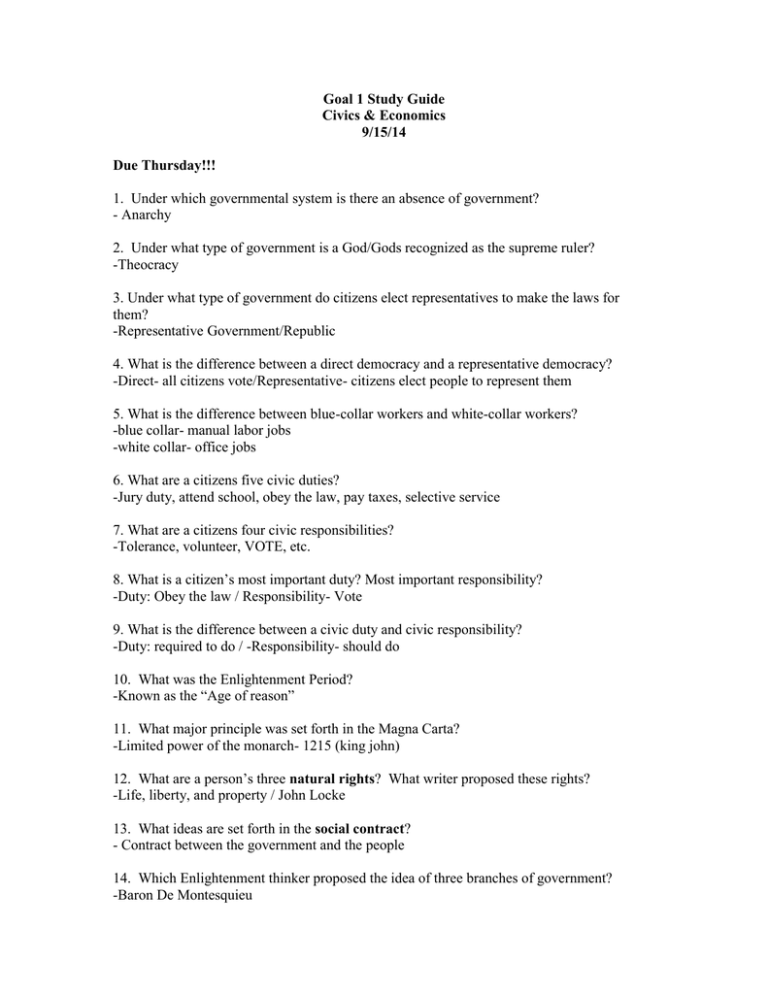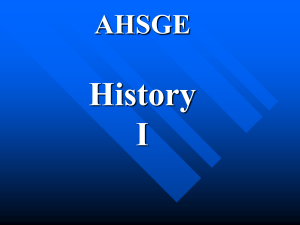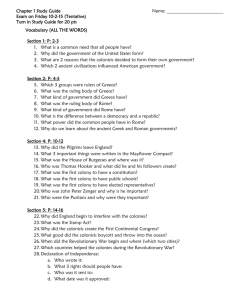Goal 1 Study Guide Civics & Economics 9/15/14 Due Thursday!!! 1
advertisement

Goal 1 Study Guide Civics & Economics 9/15/14 Due Thursday!!! 1. Under which governmental system is there an absence of government? - Anarchy 2. Under what type of government is a God/Gods recognized as the supreme ruler? -Theocracy 3. Under what type of government do citizens elect representatives to make the laws for them? -Representative Government/Republic 4. What is the difference between a direct democracy and a representative democracy? -Direct- all citizens vote/Representative- citizens elect people to represent them 5. What is the difference between blue-collar workers and white-collar workers? -blue collar- manual labor jobs -white collar- office jobs 6. What are a citizens five civic duties? -Jury duty, attend school, obey the law, pay taxes, selective service 7. What are a citizens four civic responsibilities? -Tolerance, volunteer, VOTE, etc. 8. What is a citizen’s most important duty? Most important responsibility? -Duty: Obey the law / Responsibility- Vote 9. What is the difference between a civic duty and civic responsibility? -Duty: required to do / -Responsibility- should do 10. What was the Enlightenment Period? -Known as the “Age of reason” 11. What major principle was set forth in the Magna Carta? -Limited power of the monarch- 1215 (king john) 12. What are a person’s three natural rights? What writer proposed these rights? -Life, liberty, and property / John Locke 13. What ideas are set forth in the social contract? - Contract between the government and the people 14. Which Enlightenment thinker proposed the idea of three branches of government? -Baron De Montesquieu 15. What was the House of Burgesses? -1st representative form of government / 1st colonial legislature 16. Who could vote during Colonial America? - Only white male land owners 17. What is the difference between a proprietary colony and royal colony? - Proprietary- colony owned and governed by land owners -Royal- colony governed by monarchs (kings/queens) 18. Which colonies made up the New England colonies? The middle colonies? The southern colonies? 19. Which colony was founded on Quaker ideals and freedom of religion? -Pennsylvania 20. Why did Bacon’s Rebellion take place? What did this event show about colonists? -Conflict with Native American land (Gov. Berkeley of VA wanted to protect the native Americans land from the settlers and this enraged Nathanial Bacon a Virginia planter/farmer and he led a rebellion against the government) 21. Describe the triangular trade system. What were the three parts? What was the ship route from Africa to North America called? Why was it significant? - 3 point profitable trade route between North America, Europe, and Asia (Africa-N.A. was the middle passage where slaves were shipped from Africa to the colonies) 22. Describe the economy in the following areas: - New England: cold and long winters – made their money by fishing and shipbuilding and industries - Middle: Warmer climate- fertile soil, and agriculture. Cash crops in the middle where grains- (wheat, barley, and rye) known as the “breadbasket region” -Southern: Agriculture- best soil for crops (Tobacco, cotton, rice, indigo 23. What was the Great Awakening? -Religious revival, led by Johnathan Edwards and George Whitfield 24. What is salutary neglect? -Period before the French and Indian war where Great Britain allowed the colonies to self govern as long as they were doing well economically 25. How can a country maintain a favorable balance of trade? - Export (sell) more than it Imports (buy) 26. What was the Albany Plan of Union in 1754? -Plan proposed by Benjamin Franklin to unit the colonies. Famous slogan, “Join or Die” Picture of the snake chopped up. He got this plan for the Indians- Iroquois confederacy. 27 What did the Navigation Acts state? - certain shipments had to travel through British ports –way of CONTROLING trade. 28. How did colonists respond to the Stamp Act and Quartering Acts? - Boycotted goods- refused to buy British goods 29. What did colonists mean by the phrase “no taxation without representation”? Who quoted the famous phrase? Stop taxing or look out for our interest in the colonies. We are not paying your war debt and not getting any land rights or rights in general. 30. What are writs of assistance? -General search warrant – used to enforce the navigation acts 31. What did the Proclamation of 1763 state? Explain how this enraged farmers? -Line that forbade colonists from settling west of the Appalachian mountains after the French and Indian war -Enraged farmers 32. Who wrote the pamphlet Common Sense? What did it state? -Thomas Paine- called for independence from Great Britain 33. Who was the main author of the Declaration of Independence? -Thomas Jefferson 34. Fill in the blank: main points found in the Declaration of Independence - “All men are created equal” All citizens posses unalienable rights, these include the right to (LIFE, LIBERTY, and PROPERTY) Social (CONTRACT) theory 35. Which Enlightenment Thinker were beliefs drawn from in the Declaration of Independence? -John Locke 36. Explain the motto in the Albany Plan of Union picture, Join or Die? Why is the snake chopped into pieces in the picture? What does it symbolize? -We need to unite the colonies into some form of federal government or we would die off to Great Britain -This plan was rejected by the colonists 37. What was the first tax that was levied on the colonist and enraged many colonist in 1765? -Stamp Act 38. Explain the Boston Tea Party? What happened? What was protested? What was the result? - Protest the tea act- Colonists dressed as Indians and dumped 342 chests of tea into the Boston Harbor


